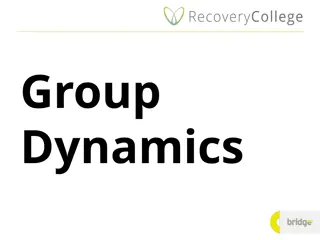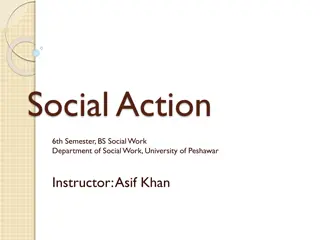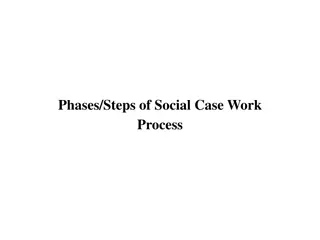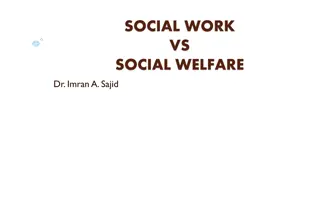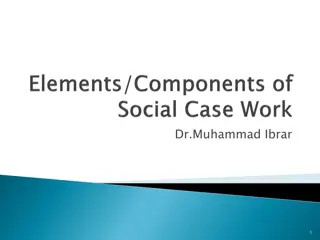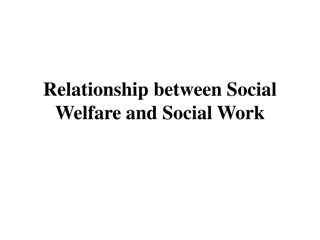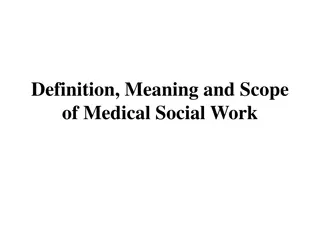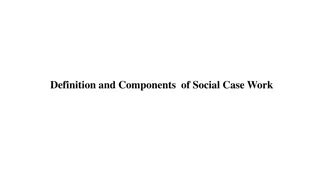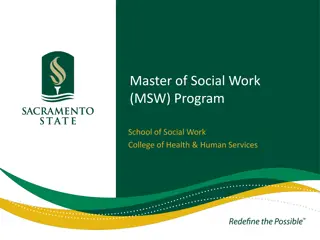Understanding the Components of Social Group Work
Social group work involves various components such as group objectives, programs, and workers. Group objectives focus on correction, prevention, growth, enhancement, responsibility, and participation. Programs are carefully planned activities that meet the needs of individuals and groups, while workers facilitate group interactions by serving as liaisons between the group and the agency. They emphasize facilitating, interpreting, and assisting rather than dominating or leading.
Uploaded on Aug 05, 2024 | 0 Views
Download Presentation

Please find below an Image/Link to download the presentation.
The content on the website is provided AS IS for your information and personal use only. It may not be sold, licensed, or shared on other websites without obtaining consent from the author. Download presentation by click this link. If you encounter any issues during the download, it is possible that the publisher has removed the file from their server.
E N D
Presentation Transcript
A. Group Objectives: The group strongly influences the behavior of its members by providing them with support, reinforcements, security, encouragement, protection, rationale, rationalization, etc. However, the group experience can be used to achieve certain objectives some of which are as follows: Correction----To provide restorative or remedial experiences, i-e., where there has been social or personal dysfunction or breakdown of individuals within social institutions. Prevention----To prevent personal and social breakdown where there is a danger of deterioration. Normal Growth and Development----To facilitate normal growth and development processes of individual members particularly during certain stressful periods in the life cycle. Personal Enhancement ----To achieve a greater measure of self fulfillment and personal enhancement through meaningful and stimulating interpersonal relations. Citizen Responsibility and Participation---- to inculcate democratic values among group members as they are helped to become responsibility involved as individuals and members of groups, as active participants in society.
B. Program: Program is a concept which broadly includes the entire range of activities, relationships, interactions and experiences which have been deliberately planned and carried out with the help of group worker to meet the needs of individuals and groups. As Konopka says, By Program is meant any activity which the group does in the presence of a group worker during the course of group meetings. Program is the vehicle through which relationships are made and needs and interests of the group and its individual members are fulfilled. However, in social group work, the program must meet the following criteria: Program should grow out of the needs and interests of the individuals who compose the group. Program should take into account such factors as age of the group members, cultural background and economic differences.
Cont Program should provide individuals with experiences and opportunities which they voluntary choose to pursue because of their inherent values. Program should be flexible and varied to satisfy a variety of needs and interests and to afford a maximum number of opportunities for participation. Program should evolve from the simple to the more complex, with movement coming as a result of group growth in ability and readiness. Movement from initially personal to social or community concerns should be an ultimate objective if our programs are to have greater social significance. Program context should provide a centre around which the members come together.
C. Worker: By worker, we mean a person who facilitates group members in group interactions. Social group worker is the most important component of group work who works as a liaison between group and agency. He/she as a representative of agency is responsible for the provision of guidance and help of the group. The way in which he/she works is a distinguished characteristic of social group work. He/she adopts a posture of facilitating rather than dominating, interpreting rather than declaring, and assisting rather than leading. In this regard, the group worker must possess few essentials and abilities of: Selection of a group. Establishing purposeful working relationship with group member. Obtaining maximum information about the group. Identification, recording and diagnosis of group needs and problems. Resolving group conflicts through mediation. Optimum utilization of agency and group resources. Collaboration between group members and agency administration Proper programme planning and development. Evaluation of programme.
D. Agency: In social group work, an agency refers to any governmental or non-governmental organization which through group work provides services. The aim of these agencies is to facilitate individuals in resolving their different issues and cater their several needs through group interaction. Such agencies help groups to attain their common goals by creating adaptation between resources and problems of group members. The performance of any agency, however, is based on several factors such as: Nature of agency Objectives and policies of agency Budget of agency Relation ship between administration and staff of the agency Relationship of staff member and group members Coordination and cooperation of agency with other agencies.





